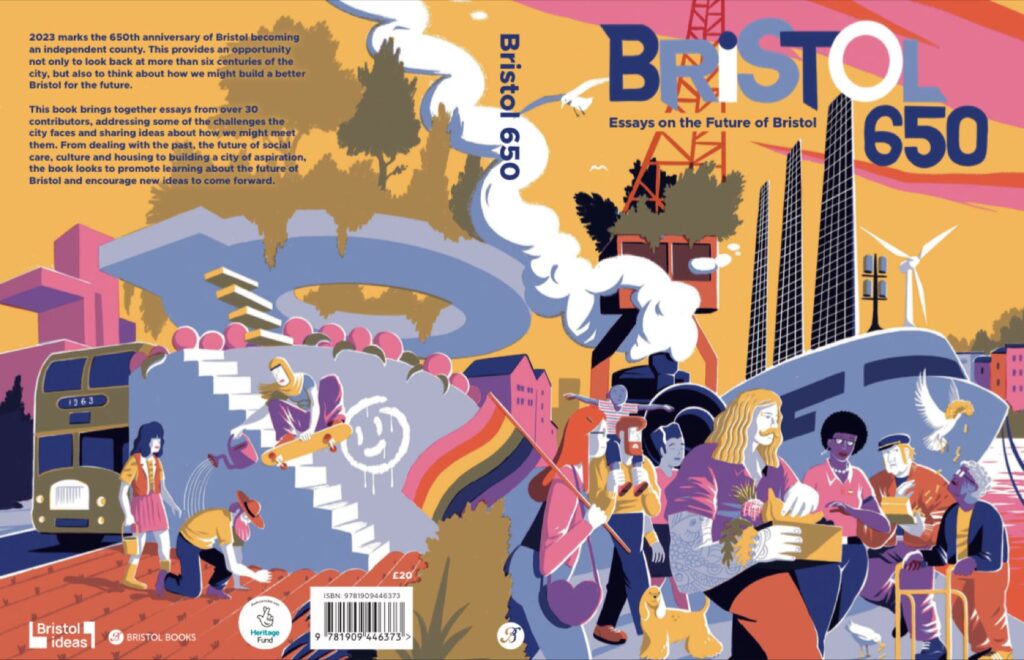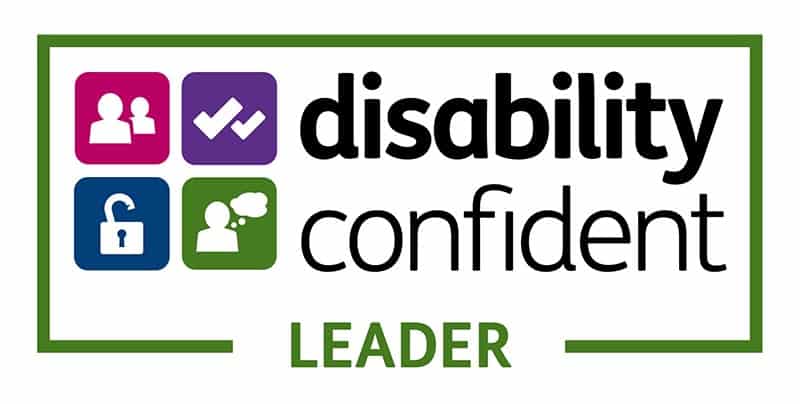WECIL’s Chief Executive, Dominic Ellison, features in a new book from Bristol Ideas bringing together essays from over 30 contributors, addressing some of the challenges Bristol faces and sharing ideas about how we might meet them. From dealing with the past, the future of social care, culture and housing to building a city of aspiration, the book looks to promote learning about the future of the City and encourage new ideas to come forward.
Bristol 650: Essays on the Future of Bristol will be released on 23rd October. Free copies will be available at selected Festival of the Future City events in October 2023, or you can find articles featured in the book at bristolideas.co.uk/bristol650book.
Dominic’s essay is reproduced below, but the original online version can be found here.

An audio version of the article is available here.
Bristol has a prominent place in the history of Disabled people’s activism. I’m honoured to work for WECIL (West of England Centre for Inclusive Living), one of the Disabled People’s Organisations (DPOs) emerging from the Avon Coalition of Disabled People, whose campaigning for ‘Rights Not Charity’ in the 1980s and 1990s transformed the city’s service provision and contributed significantly to national work securing new rights for Disabled people in the Disability Discrimination Act (later the Equalities Act) and the Care Act, which gave Disabled people implicit rights to choose to remain part of mainstream society and avoid institutionalisation.
While we continue to fight to safeguard our rights to equal inclusion on local and national stages, I observe the Disabled People’s Movement failing to harness the key allyship that underpins the light being shone by other equalities movements that are bringing attention to important issues and creating a more just and equitable society. My vision for Bristol is a city grasping the mantle in this key moment of social progression to support Disabled people’s advancement from reliance on a safety net of rights-in-law to the comfortable expectation of inclusion on an equal basis to non-disabled people in their day-to-day lives.
Key to this is what we understand ‘disability’ to mean. One way of thinking about disability is that a person is born ‘faulty’ (or becomes faulty due to accident, illness or age). In this thinking, someone is diagnosed and becomes labelled as a ‘Person with a Disability’. Their ‘faultiness’ becomes the focus, and their ordinary needs are put on hold as they are segregated and provided alternative services – with a hope of re-entering society should these efforts support them to become ‘normal’ enough. This thinking largely underscores what we mean when we talk about the Medical Model of Disability.
The model through which DPOs and the wider Disabled People’s Movement views disability is known as the Social Model of Disability, which recognises that people are Disabled not because they are somehow deficient, but due to the barriers we have created as a society. It is then an anathema to talk of a person ‘having a disability’, because disability is not inherent to the individual. Disabled people have impairments (which may be physical, sensory, or cognitive), but it is in the lack of effort to be inclusive of everyone’s needs that makes a person Disabled. Where the Medical Model focuses on what is ‘wrong’ with a person, the Social Model focuses on what is wrong with society.
This is beyond semantics. If, as an employer, I recognise that a candidate cannot fully perform the role they have applied for because they ‘have a disability’, then surely there is little I can do about it – I’m not a doctor after all. However, when viewed through the Social Model, if a Disabled person applies for a role and it transpires that the work would be inaccessible to them, the responsibility is mine to work with the applicant to identify and remove the barriers that exclude them. If, incidentally, you are an employer who finds this does not apply to you as you don’t receive applications from Disabled people, it is your responsibility to identify and remove the barriers preventing one in five people from seeking to join your workforce.
A colleague recently provided consultancy for a housing association to advise on upgrading their homes to meet the access needs of a wider range of Disabled people. The pushback received was that these improvements would narrow the number of people for whom the homes are suitable as ‘non-disabled people don’t want to live in a social care setting’. The shocking news is – neither do Disabled people.
Interesting things happen when we design for accessibility. The Independent Living Movement which gave rise to a particular type of DPO – Centres for Independent Living (such as WECIL) – has its origins in Berkeley, California, where in the 1970s activists went out under cover of darkness cutting ramps into kerbs so that wheelchair users could cross through town without assistance. This simple intervention has since been adopted globally and dropped kerbs are now a default feature in our urban landscape, essential not only for wheelchair users, but for anyone navigating the cityscape while, for example, pushing a buggy. This change has had further positive impacts on design – luggage has been reimagined to take advantage of wheel-friendlier environments. We no longer see dropped kerbs as a feature of ‘Disabled-friendly pavements’, simply of ‘better pavements’.
Many technological interventions are now so ubiquitous that we don’t recognise that their original purpose was to support people with specific impairments. They have shed their ‘assistive technology’ label and become base expectations of convenient interaction with our phones, computers and even lightbulbs.
To meet the needs of all its citizens, Bristol must go beyond thinking about how to make society more ‘accessible’ – with its inevitable biases that separate ‘normal’ users from those with ‘access needs’, to thinking in terms of ‘inclusion’ as a necessity, rather than an enhancement. WECIL promotes the principle of Inclusive Design – a process in which products, services and environments are designed to be usable by as many people as possible.
Bristol has its share of leaders in this space. We The Curious recognised years ago that its visitors did not sufficiently represent the local demographic. It wanted to ensure that it was a safe and welcoming space for everybody and was conscious of the need for change both within the physical environment and its whole identity as an organisation. It started by commissioning support from WECIL’s Disability.Inc. consultancy service, including an access audit to ensure the building’s major renovation considered its physical accessibility. It added key features such as a Changing Place bathroom, featured on the national Changing Places map. Its large space and hoist opened the museum to Disabled people reliant on such facilities, and by offering its use to everyone, not just its visitors, opened the city centre to many who would find visiting otherwise impossible.
We The Curious recognised that physical accessibility of the building was only the start of its journey to inclusion. ‘Inclusive Curious City’ is the name of our resulting strategic partnership; its ambition: to work with ‘audiences from all backgrounds to harness curiosity as the platform for user-led co-production and influence others to join us in working towards making Bristol the world’s most inclusive city’. We The Curious’ work with WECIL members to shortlist questions from the people of Bristol inspired installations in the ‘Project What If’ exhibition in 2021, and it provided a home for a WECIL Peer Support Group’s ‘Curiosity Club’.
Going beyond notions of ‘compliance’ and tick-boxes, by working closely with a DPO, We The Curious internalised Disability Equality into its practice, embedded structures to scrutinise inclusion across all services, and developed an organisational voice that underpins a culture of full inclusion.
Around the corner, another leader in the journey to inclusion, Watershed, formed a consortium of Bristol venues that recognised their struggle to achieve accessibility could only be overcome by working directly with people with a lived experience of the challenges they were aiming to tackle. Watershed holds inclusion as a core value across their work and sought support from WECIL in access audits for a major capital redevelopment, policy reviews, assessing its support to Disabled artists and valuing Disabled staff and visitors alike. Our partnership was highlighted in its successful application to the latest round of Arts Council National Portfolio Organisations, as is true for St Pauls Carnival.
Bristol’s institutional drive towards Disability Equality reflects how the vanguard of positive societal change is often found in the arts. These organisations are to be celebrated but can only achieve so much in isolation. What is the point of cultural institutions achieving the highest standards of access and inclusion if many Disabled people are unable to visit due to poor public transport links and a streetscape that is dangerous to negotiate by wheelchair, or by people with a visual impairment?
Many key decisions are taken without the involvement of Disabled people. In achieving international recognition for its leadership in cities tackling the climate crisis, Bristol’s actions overlooked the needs of people whose genuine reliance on cars to access basic services has made the city centre a wholly inaccessible destination, despite Bristol Disability Equality Forum’s expansive work on this.
Bristol’s development into a place where Disabled people thrive requires a wide range of Disabled people, representing the full spectrum of impairments, to be included in decision-making about the future of our built environment, transport, housing, health, education, employment, shopping, night-time economy, civic participation and thriving cultural scene.
We can’t assume to know what others need. Just as Black Lives Matter demonstrates a need to align behind the leadership of Black people, and MeToo spotlights gender inequities and power dynamics by promoting women’s voices, so too Disabled people and their organisations need to be an integral part of decision making to realise Inclusive Curious City’s objective of making Bristol the world’s most inclusive city – something we can be proud to achieve.



